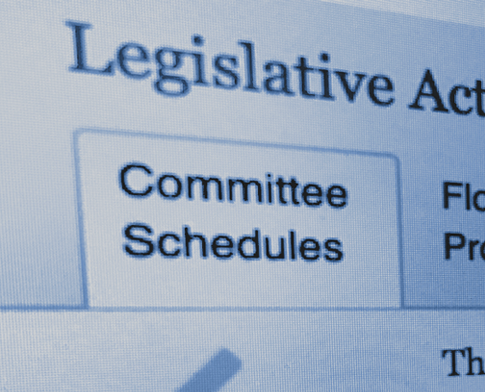Health Update (November 5)
As the House voted to continue its impeachment inquiry into President Trump this week, numerous healthcare headlines emerged as well. Atop those headlines were Rep. Greg Walden (R-OR-02), the Ranking Member of the House Energy & Commerce Committee, announcing he would not seek reelection and Senator/2020 presidential candidate Elizabeth Warren (D-MA) releasing her full “Medicare for All” plan that she claims will not raise middle class taxes. In Capitol Hill action, the House E&C Health Subcommittee held a hearing on pharmaceutical supply chains and the Senate Finance Health Subcommittee held a hearing on Medicare eligibility requirements. Elsewhere, CMS announced it would halve a proposed behavioral adjustment cut in its final home health pay rule.
Rep. Greg Walden Retiring
Walden, the top Republican on the House Energy and Commerce Committee, announced his intention to retire at the end of this Congress. Walden, who was first elected in 1998, said he was confident he’d win reelection but decided instead to end his congressional career at the conclusion of the 116th Congress. “Based on recent polling, strong fundraising, and the backing of my wife and family, I am confident I could earn the support of 2nd District voters for another term. I’m also optimistic that a path exists for Republicans to recapture a majority in the House, and that I could return for two more years as chairman of the House Energy and Commerce Committee,” Walden said. “But I also know that for me, the time has come to pursue new challenges and opportunities.” The Oregon congressman is the 17th House Republican to announce their retirement this cycle, a sign of how difficult it will be for the GOP to win back the majority in what’s already shaping up as a tough 2020 election. Having President Trump’s name at the top of the ticket will ensure turnout among his supporters, yet it’s also expected to bring Democrats out in huge numbers as well.[1]
House E&C Hearing on Pharmaceutical Supply Chain
The House Energy & Commerce Subcommittee on Health held a hearing on Wednesday (Oct. 30) entitled: “Safeguarding Pharmaceutical Supply Chains in a Global Economy.” Committee members expressed deep concern over the dependency of the U.S. drug supply on foreign sources, particularly Chinese manufacturers. Subcommittee Chairman Anna Eshoo (D-CA), Subcommittee Ranking Member Michael Burgess (R-TX), and Full Committee Ranking Member Greg Walden (R-OR) noted how China could weaponize pharmaceuticals against the United States. Full Committee Chairman Frank Pallone (D-NJ) encouraged domestic production of pharmaceuticals through advanced manufacturing techniques. The witnesses in the first panel, Dr. Janet Woodcock and Michael Wessel, discussed how and why drug manufacturing has moved out of the U.S., especially Active Pharmaceutical Ingredient (API) manufacturing, and the implications for both the Food and Drug Administration’s (FDA) oversight capacities and national security. In the second panel of witnesses, Subcommittee Chairman Eshoo and Rep. Doris Matsui (D-CA) questioned David Gaugh of the Association for Accessible Medicines (AAM) on generic industry processes and practices. Rep. Matsui attempted to link generic drug quality to the use of foreign-made APIs. There was broad, bipartisan concern in the committee over the vulnerability of the U.S. drug supply and the FDA’s ability to regulate an international pharmaceutical supply chain. To read an executive summary of this hearing, click here.
Senate Finance Hearing on Medicaid Eligibility
The Senate Finance Subcommittee on Health held a hearing on Wednesday (Oct. 30) entitled: “Medicaid: Compliance With Eligibility Requirements.” The hearing on Medicaid eligibility quickly saw raucous contention, especially relating to getting low-income people covered, and whether or not taxpayer dollars were being properly spent. Committee Republicans noted the statistics of the billions of dollars in unwisely spent taxpayer money in the Medicaid program and called for higher oversight of state procedures, while Committee Democrats pointed to the lack of coverage amongst eligible people, along with the bureaucratic requirements that prevent low-income individuals from properly applying for the program. The most heated discussion came during Sen. Sherrod Brown’s (D-OH) questioning, when he questioned Daryl Purpera, a State Auditor from Louisiana, about his lack of expertise on Medicaid statistics in Louisiana. Sen. Bill Cassidy (R-LA) came to Mr. Purpera’s defense during his questioning and called out Sen. Brown for his rude questions and noted that Mr. Purpera was here to talk about eligibility requirements. To read an executive summary of this hearing, click here.
OTC Monograph Reform Bill
This week, the Senate H.E.L.P. Subcommittee on Health held a markup sending legislation to the floor that would reform the Food & Drug Administration (FDA)’s regulation of over-the-counter drugs, including setting up a user fee program and providing 18 months of exclusivity for innovative OTC drug products, as proposed by the House. The House revived its version of the OTC monograph reform bill back in June, which also grants 18 months of exclusivity to innovative OTC drugs. In the last session of Congress, the House and Senate bills had differed when it came to exclusivity, with the Senate at that point providing two years to innovative products. By adopting the House’s exclusivity approach, the updated Senate bill faces a clear path toward enactment. During the markup, Sen. Mike Braun (R-IN) signed on as a co-sponsor to the bill, underscoring that he wants to make sure OTC drug makers are incentivized for investing in research and development but that they also don’t “game the system” by delaying market entry of new products. The bill, sponsored by senators Johnny Isakson (R-GA) and Bob Casey (D-PA), passed out of the Senate H.E.L.P. Committee during the last session of Congress, but was never taken up on the Senate floor. Media reports last year indicated the bill was held up due to infighting between Isakson and Sen. Richard Burr (R-NC), who sponsored the pandemic preparedness bill that was signed into law a few months ago. Burr reportedly placed a hold on the OTC reform bill because of seemingly unrelated issues with FDA’s enforcement of e-cigarettes. [2]
CMS Home Health Cut in Half
CMS halved a proposed behavioral adjustment cut this week in its final home health pay rule meant to offset potential spending increases under a new home health payment model after industry backlash. Under the final rule, this cut is based on the assumed behavior of home health agencies under the new pay model set to go into effect Jan. 2020. The Bipartisan Budget Act of 2018 required a move from 60-day episodes of care to 30-day episodes of care under the home health prospective pay system, but also required the change to be budget-neutral in 2020. To offset a 1.3% increase in aggregate Medicare payments to home health agencies in 2020, CMS proposed an 8% cut based on its assumption of how home health agencies might act under the new system. The cut was quickly opposed by the industry and lawmakers, even prompting a bicameral, bipartisan bill that would require CMS to use claims data before imposing behavioral adjustment while also maintaining budget neutrality over multiple years. In its final rule, CMS agreed to nearly halve the cut, instead finalizing a 4.36% cut based on assumed behavior. According to CMS, the adjustment will be made using the same behavior assumptions finalized in the 2019 pay rule. [3]
Elizabeth Warren Releases “Medicare for All” Plan
Sen. Elizabeth Warren (D-MA) released her full “Medicare for All” plan on Friday (Nov. 1), pledging not to raise middle class taxes, as she’s responded to pressure from emerging as one of the front-runners for the 2020 Democratic presidential nomination. In a new outline, Warren’s campaign said her single-payer health care plan would cost the country “just under” $52 trillion over a decade, which includes $20.5 trillion in new federal spending. It estimates the proposal would cost just less than the estimated $52 trillion in spending for the current system over 10 years. Warren’s campaign says it will shift the burden of most health care costs from consumers, in the form of spending such as premiums, deductibles and copays, to federal and state governments and employers. Here are some of the methods Warren’s campaign outlines to cover the plan’s costs, in terms of both reducing spending and raising money:
- A new employer Medicare contribution to raise $8.8 trillion, which the campaign says would save companies $200 billion relative to what they would have shelled out under the current system.
- Cutting administrative costs by scrapping private insurers.
- Negotiations to reduce drug spending.
- Better enforcement of existing tax laws to raise $2.3 trillion more in revenue.
- Taxes on “the financial sector, large corporations and the top 1% of individuals.” Changes in taxes on the investing community and large companies could raise an estimated $3.8 trillion, according to Warren’s campaign.
- Warren appeared to take her proposed wealth tax further under the health care plan, saying wealth over $1 billion would be taxed at 6% rather than the currently proposed 3%. The change would raise an additional $1 trillion, the campaign said. Overall, Warren’s campaign estimates that it can take in $3 trillion for the health care plan by “asking the top 1% of households in America to pay a little more.”
- $400 billion more in tax revenue through immigration reform
- Eliminating the Overseas Contingency Operations military fund to save about $800 billion over a decade [4]
The full outline of Warren’s plan can be found on her campaign website here.
References
[1] Bresnahan, John. “Walden to Retire in Latest Sign of GOP Doubts About Retaking House.” Politico Pro. 28, Oct. 2019. https://subscriber.politicopro.com/article/2019/10/walden-to-retire-in-latest-sign-of-gop-doubts-about-retaking-house-1814113
[2] Wang, Beth. “Senate Health Panel Sends OTC Monograph Reform Bill To The Floor. Inside Health Policy. 31, Oct. 2019. https://insidehealthpolicy.com/daily-news/senate-health-panel-sends-otc-monograph-reform-bill-floor
[3] Cirruzzo, Chelsea. “CMS Halves Originally Proposed Home Health Cut In Final 2020 Pay Rule. Inside Health Policy 31 Oct. 2019. https://insidehealthpolicy.com/daily-news/cms-halves-originally-proposed-home-health-cut-final-2020-pay-rule
[4] Pramuk, Jacob. “Elizabeth Warren says she would not raise middle class taxes for $52 trillion health care plan.’ CNBC. 1 Nov. 2019. https://www.cnbc.com/2019/11/01/elizabeth-warren-releases-plan-to-pay-for-medicare-for-all.html
HOUSE.GOV
The Week Ahead
For the main events of the next week and more, go straight to the key events on the house.gov website.
SENATE.GOV
The Week Ahead
For the main events of the next week and more, go straight to the key events on the senate.gov website.


